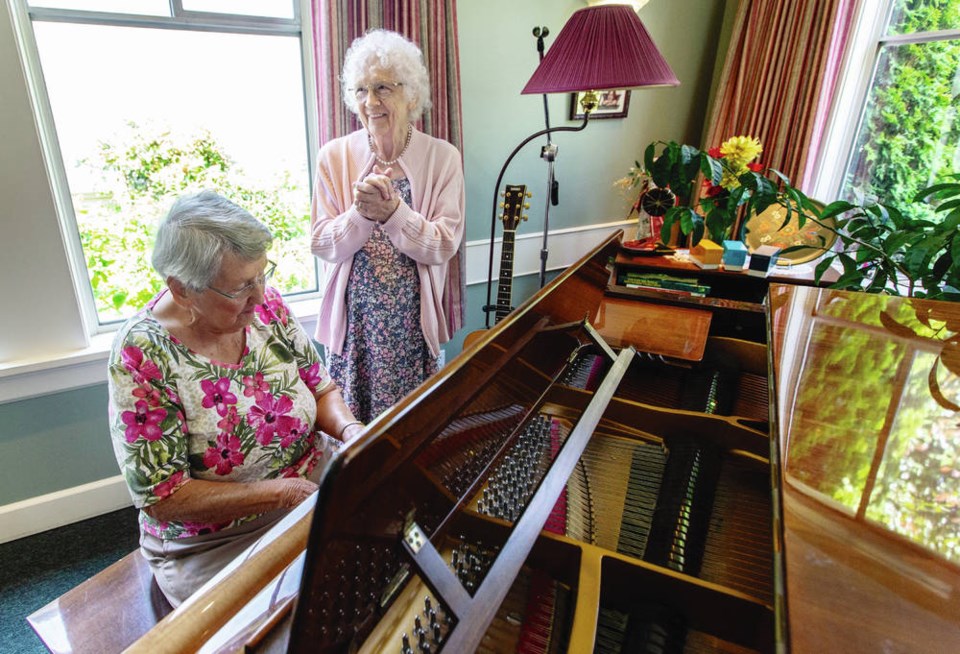As was true in most seniors’ homes, a cloud descended on Victoria’s Rose Manor when the pandemic set in.
COVID rules kept visitors at bay. Group activities ceased — no bingo, no exercise classes, no congregating with others, nothing. Common areas, including the lounge and its grand piano, were out of bounds. Life became smaller.
That’s why, in March 2020, resident Margaret Jones asked to have her electric piano brought down from her suite to the dining room.
Every time lunch was served — there were two sittings, due to physical-distancing requirements — Jones began to play. Für Elise, perhaps, or maybe Hagood Hardy’s The Homecoming. On Sundays, she’d work in some hymns.
After a while, performing two-a-day concerts became a bit much, so she began splitting keyboard duties with fellow resident Barbara Johnstone. “I played everything from Chattanooga Choo Choo to Pomp and Circumstance,” Johnstone says. Maybe some Elvis or Perry Como or Bach.
Another resident, Ruby Attwood, said those in the dining room tended to listen to Jones, whose tastes tilted toward classical music, but would sing along to Johnstone, who leaned toward more popular fare.
Attwood also said this: Together, the women kept spirits afloat during a dark and frightening time, continuing to do so every lunch hour until just recently. “Those ladies saved the day. They saved our bacon.”
She says this sincerely, reflecting a reality that many of us, preoccupied with our own problems, don’t always remember: The pandemic has been particularly hard on older people, whether they be in independent-living facilities like Rose Manor or in care homes where the prospect of an outbreak sent shivers.
For Attwood, COVID-prevention protocols meant limited opportunities to see her husband, who has Alzheimer’s. He lives right across the street in Mount St. Mary Hospital, but she found herself restricted to three one-hour visits a week. Although a cheerful sort (you might recall her from a 2020 column in which she thumbed her nose at COVID with lyrics set to If You’re Happy and You Know It), she acknowledges it has been grim.
For Johnstone, the pandemic meant that after a heart attack sent her to the ER in September, she had to go into quarantine once released from hospital. “I was all by myself in my room for my 90th birthday.” She says winter was particularly tough on people who live alone; they would find themselves waiting for meal times to relieve the isolation.
That’s the context in which the piano playing must be seen. It was part of an effort to push back against the way the pandemic had diminished life. To cope, residents had to be innovative, Jones said. “It was seeing what you could do, not what you couldn’t do,” she said.
Some tended garden boxes, leading to a brilliant display on the patio today. Others picked up their knitting needles and made garments for the homeless. A third pianist, Rosemarie Benesch, joined Jones and Johnstone, sliding in when the opportunity arose.
If playing brought joy to the listeners, it also pumped up the players. “Sometimes I’d rather play than eat my lunch, I was enjoying it so much,” Johnstone says. Jones concurs: “It was really special.”
The women have long associations with the piano. Johnstone taught the instrument for more than 50 years. Jones, 84, was just a child in Stafforshire, England, when, at the end of the Second World War, her father took his demobilization money and bought a piano.
When a family with more pressing needs decides to make music a priority, you had better learn to play, so Jones did. She credits her mother with teaching her perseverance — which, over the past year and a half, has become a valuable attribute.
Both Johnstone and Jones were teachers, and both married clergymen (Johnstone’s husband, a United Church minister, died two years ago, while Jones’ husband, an Anglican, lives with her in Rose Manor). Both women have led choirs, played church organs and know how music can lift those in need. Their fellow residents are grateful for that.



